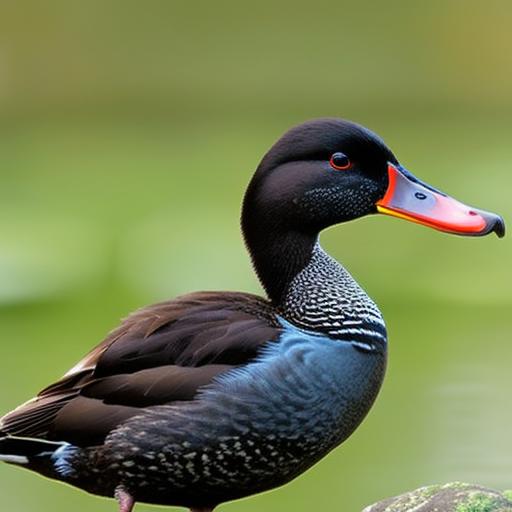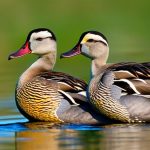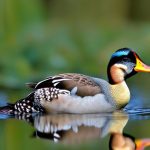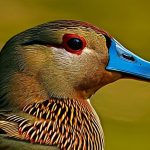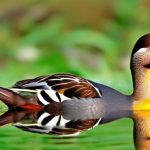Black ducks are a group of waterfowl species that are known for their dark plumage. They are found in various parts of the world and play an important role in ecosystems. Black ducks are highly adaptable and can thrive in a variety of habitats, including wetlands, marshes, and rivers. They are also known for their unique behaviors and characteristics, making them a fascinating species to study.
Key Takeaways
- Black ducks are a group of duck breeds with dark plumage and distinct characteristics.
- They are known for their adaptability, hardiness, and ability to thrive in various habitats.
- Black ducks have a rich history in North America, where they were once hunted extensively for their meat and feathers.
- There are several types of black ducks, including the American black duck, the Pacific black duck, and the African black duck.
- Black ducks play an important role in ecosystems as seed dispersers, insect controllers, and indicators of wetland health.
Characteristics of Black Ducks
Black ducks are medium-sized birds with a stocky build and a wingspan of about 30 inches. They have dark brown or black plumage, which helps them blend in with their surroundings. Their bills are yellow or orange, and their legs and feet are grayish in color. Black ducks have a distinctive call that is often described as a low, raspy quack.
In terms of behavior, black ducks are known for their strong flying abilities and their ability to dive underwater for food. They are also social birds and can often be found in small groups or pairs. Black ducks are primarily herbivorous, feeding on aquatic plants, seeds, and insects. They also eat small fish and crustaceans when available.
History of Black Ducks
Black ducks have a long history that dates back millions of years. They are believed to have evolved from a common ancestor with other duck species around 10 million years ago. Over time, black ducks have adapted to different environments and developed unique characteristics.
Black ducks are migratory birds, meaning they travel long distances between breeding and wintering grounds. They typically breed in northern regions during the summer months and migrate south to warmer areas during the winter. Their migration patterns can vary depending on the species and the availability of food and suitable habitats.
Types of Black Ducks
There are several different species of black ducks, each with its own unique characteristics. Some of the most well-known species include the American black duck, the Pacific black duck, and the African black duck.
The American black duck is native to North America and is known for its adaptability and resilience. It is a medium-sized duck with a dark brown body and a lighter-colored head. The Pacific black duck is found in Australia, New Zealand, and parts of Southeast Asia. It has a similar appearance to the American black duck but has a more mottled plumage.
The African black duck is found in sub-Saharan Africa and is known for its striking black plumage. It is slightly larger than the American black duck and has a distinctive white patch on its wings. Each species of black duck has its own unique characteristics and adaptations that allow it to thrive in its specific habitat.
Physical Appearance of Black Ducks
Black ducks are known for their dark plumage, which helps them blend in with their surroundings. They have a stocky build with a rounded head and a short neck. Their bills are typically yellow or orange, and their legs and feet are grayish in color.
The feathers of black ducks are dense and waterproof, which allows them to stay warm and dry even in wet conditions. They have strong wings that enable them to fly long distances, and their webbed feet are adapted for swimming and diving.
In terms of size, black ducks range from about 20 to 24 inches in length, with a wingspan of around 30 inches. Males and females are similar in appearance, although males may have slightly brighter plumage during the breeding season.
Habitat and Distribution of Black Ducks
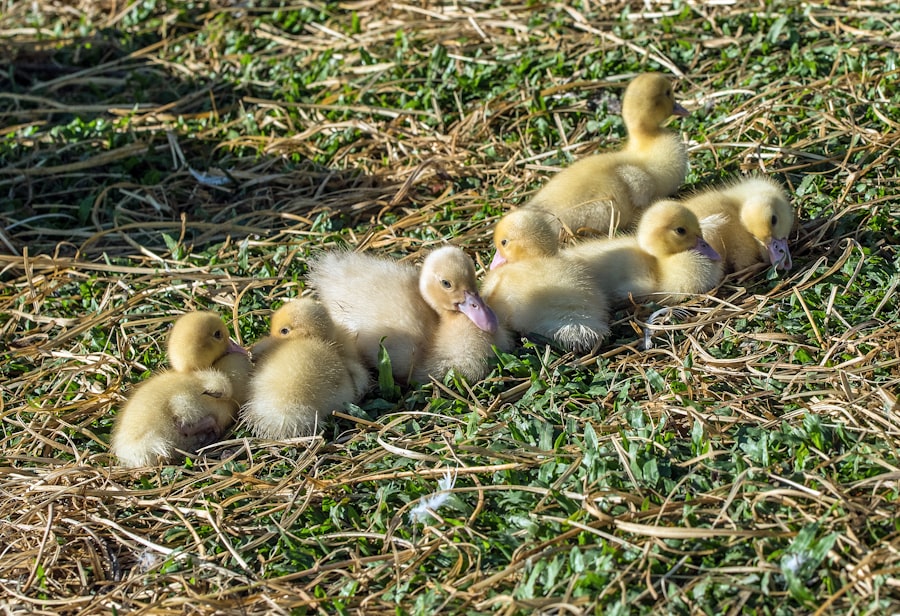
Black ducks can be found in a variety of habitats, including wetlands, marshes, rivers, and lakes. They prefer areas with dense vegetation and ample food sources. Black ducks are highly adaptable and can thrive in both freshwater and saltwater environments.
In terms of distribution, black ducks are found in various parts of the world. The American black duck is native to North America and can be found throughout the eastern United States and parts of Canada. The Pacific black duck is found in Australia, New Zealand, and parts of Southeast Asia. The African black duck is found in sub-Saharan Africa.
Behavior and Diet of Black Ducks
Black ducks are social birds and can often be found in small groups or pairs. They are highly adaptable and can adjust their behavior and feeding habits based on the availability of food and suitable habitats.
Black ducks are primarily herbivorous, feeding on aquatic plants, seeds, and insects. They also eat small fish and crustaceans when available. They have a unique feeding behavior where they dive underwater to search for food. They use their webbed feet to propel themselves underwater and their bills to grab and consume their prey.
During the breeding season, black ducks engage in courtship displays, with males performing elaborate displays to attract females. They build nests on the ground or in vegetation near water bodies and lay a clutch of eggs. Both males and females take turns incubating the eggs and caring for the young.
Conservation Status of Black Ducks
The conservation status of black ducks varies depending on the species and the region in which they are found. Some species, such as the American black duck, have experienced declines in population due to habitat loss, hunting, and competition with other bird species.
Efforts are being made to conserve black ducks and their habitats. These include creating protected areas, implementing hunting regulations, and restoring wetland habitats. Conservation organizations are also working to raise awareness about the importance of black ducks and the need to protect their populations.
Importance of Black Ducks in Ecosystems
Black ducks play an important role in ecosystems as both predators and prey. They help control populations of insects, small fish, and crustaceans by feeding on them. They also serve as a food source for larger predators, such as birds of prey and mammals.
Black ducks also contribute to the dispersal of seeds and the pollination of plants. When they feed on plants, they may inadvertently carry seeds to new locations, helping to spread plant species. Additionally, their movements between different habitats can help pollinate flowers and facilitate the reproduction of plant species.
Overall, black ducks are an integral part of ecosystems and their conservation is important for maintaining ecological balance.
Raising Black Ducks as Domesticated Birds
Some people choose to raise black ducks as pets or for commercial purposes. Raising black ducks can be a rewarding experience, but it requires careful planning and preparation.
If you are considering raising black ducks as pets, it is important to provide them with a suitable habitat. This includes a secure enclosure with access to water for swimming and bathing. Black ducks also require a balanced diet that includes a variety of foods, such as grains, vegetables, and insects.
If you are raising black ducks for commercial purposes, it is important to comply with local regulations and obtain the necessary permits. You will also need to provide appropriate housing and facilities for the ducks, as well as a reliable source of food and water.
Black ducks are a fascinating group of waterfowl species that play an important role in ecosystems. They are known for their dark plumage, adaptability, and unique behaviors. Black ducks can be found in various parts of the world and have evolved to thrive in different habitats.
Conservation efforts are underway to protect black ducks and their habitats. These efforts include creating protected areas, implementing hunting regulations, and restoring wetland habitats. It is important to recognize the importance of black ducks in maintaining ecological balance and to take steps to ensure their long-term survival.
Whether you choose to raise black ducks as pets or for commercial purposes, it is important to provide them with a suitable habitat and a balanced diet. Raising black ducks can be a rewarding experience, but it requires careful planning and preparation. By understanding the needs of black ducks and taking steps to meet those needs, you can help contribute to their conservation and ensure their well-being.
If you’re considering keeping black duck breeds, it’s important to provide them with a suitable and comfortable living space. One option is to convert a shed into a chicken coop, which can be a cost-effective solution. To learn more about this process, check out this helpful article on poultrywizard.com. Additionally, if you’re wondering whether turkeys need a coop or not, this informative article on poultrywizard.com will provide you with all the necessary insights. Lastly, for an interesting and unique idea, you might want to explore the concept of a chicken coop trampoline. Discover more about this innovative approach in the article available at poultrywizard.com.
FAQs
What are all black duck breeds?
All black duck breeds are domesticated ducks that have black feathers covering their entire body.
What are some examples of all black duck breeds?
Some examples of all black duck breeds include the Black Swedish, Cayuga, and Indian Runner ducks.
What is the origin of all black duck breeds?
The origin of all black duck breeds is not clear, but it is believed that they were developed through selective breeding.
What is the size of all black duck breeds?
The size of all black duck breeds varies depending on the breed, but they generally range from small to medium-sized ducks.
What is the temperament of all black duck breeds?
The temperament of all black duck breeds varies depending on the breed, but they are generally known to be calm and friendly.
What is the purpose of all black duck breeds?
All black duck breeds are primarily kept for their meat, eggs, and ornamental purposes.
What is the lifespan of all black duck breeds?
The lifespan of all black duck breeds varies depending on the breed, but they generally live for 5-10 years.
What is the diet of all black duck breeds?
The diet of all black duck breeds consists of a combination of commercial duck feed, grains, vegetables, and insects.
Meet Walter, the feathered-friend fanatic of Florida! Nestled in the sunshine state, Walter struts through life with his feathered companions, clucking his way to happiness. With a coop that’s fancier than a five-star hotel, he’s the Don Juan of the chicken world. When he’s not teaching his hens to do the cha-cha, you’ll find him in a heated debate with his prized rooster, Sir Clucks-a-Lot. Walter’s poultry passion is no yolk; he’s the sunny-side-up guy you never knew you needed in your flock of friends!

